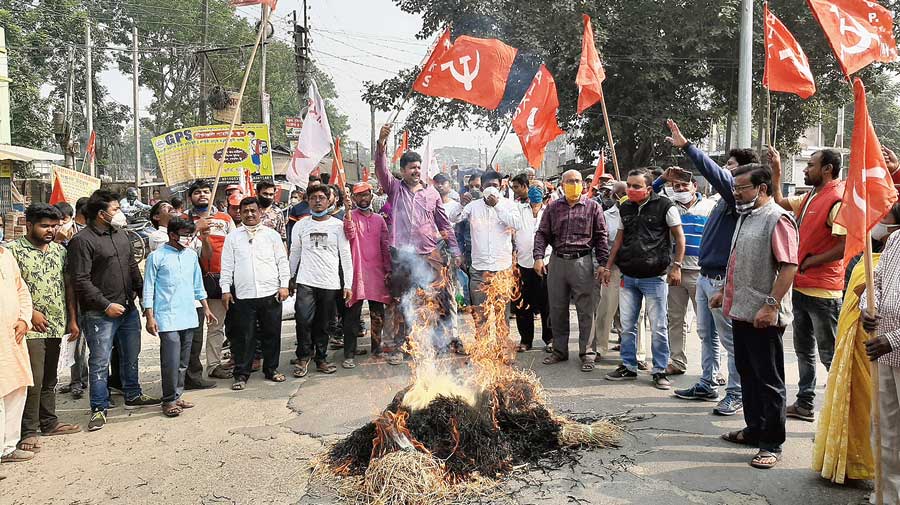Mamata Banerjee will hold a “mega rally” in Calcutta on December 10 and other programmes across Bengal to protest against the Narendra Modi government’s new farm laws and hold amendment to the Essential Commodities Act responsible for recent rise in the price of potato.
The Bengal chief minister met her senior colleagues in the Trinamul Congress on Friday to draw up a roadmap on how to make the farm laws an issue in the state at a time the Centre seemed to be clearly on the backfoot because of the continuing protest by farmers on the borders of New Delhi.
“After deliberations (in Trinamul), it was decided that the focus of the protests in Bengal would be on amendment to the Essential Commodities Act. Didi herself will launch the state-wide agitation from Midnapore on December 7. She also plans to hold rallies in Bongaon on December 9, in addition to a mega rally in Calcutta on December 10,” said a Trinamul leader.
The fact that the amendment to the Essential Commodities Act would be the main point of the movement was clear on Friday morning when Trinamul MP Kakoli Ghosh Dastidar held the changes responsible for spiralling prices of potato and onion.
Sources close to the chief minister have said it is a tactful move to identify the Essential Commodities (Amendment) Act to build up the agitation as it has relevance in case of Bengal and people — even non-farming community — can understand its impact.
A senior agriculture department officer said the state government had lost two important tools to contain prices because of the amendment. First, it can no longer conduct raids against hoarding of essential commodities like potatoes. Second, the government cannot curb movement of the commodities to other states.
“The result was visible from October. Price of potato reached an all time high of Rs 45 a kg in retail markets. As common people felt the immediate pinch of the new farm laws, the chief minister is trying to use it to connect with them,” said the official.
The sources also said Mamata was likely to point out during her rallies that the Essential Commodities (Amendment) Act did not offer any benefit to the farmers while it left common people in trouble by encouraging the black marketeers.
“For example, farmers had sold potato at Rs 10 to Rs 12 a kg in February-March this year. But common people had to buy the produce at Rs 45 in October-November after the new farm laws were introduced. So, only a section of traders and hoarders got the benefit of the new acts,” said a source.
The Trinamul leadership, said multiple sources, is of the view that a series of rallies on the issue of rise in the prices of essential commodities would help them create a mood against the farm laws in Bengal, which has not yet witnessed any major protest till now.
A source in Trinamul said the party was aware the two other laws — Farmers’ Produce Trade and Commerce (Promotion and Facilitation) Act and Farmers (Empowerment and Protection) Agreement on Price Assurance and Farm Services Act — did not hold much relevance in Bengal, where the established rules of agri business are a bit different.
“The farmers of Haryana and Punjab are opposing the laws as they apprehend that the Centre might withdraw the system of offering minimum support price (MSP) for their produce citing that they have been offered a bigger market. But these two laws have little impact in Bengal as farmers in the state are neither dependent on mandis to sell their produce nor are they heavily dependent on the government’s procurement system,” said an official in the agriculture department.
According to sources, only about 40 lakh tons of rice out of a total production of about 165 lakh tons are procured by government agencies annually.
“So, roughly less than 25 per cent of the 72 lakh farmers can sell off their produce to the government securing MSP. As the majority of farmers, particularly small and marginal farmers, are dependent on the open market to sell their produce, these laws don’t have that much impact in Bengal,” said a source.
As rice is the staple food in Bengal and the consumption requirement (158 lakh ton annually) is close to its annual production, farmers can get an average price for their produce throughout the year.
“This is the reason why Bengal is historically not dependent on the mandi system to sell their produce to the government,” said an official who handled the responsibility of agriculture and food and supplies departments for years during the Left Front rule.
And the law to allow contract farming has also little impact in the state as it was already allowed here a few years ago after farmers’ organisations were allowed to sign contracts with private investors.
“Once we can build an opinion against the Essential Commodities (Amendment) Act, it would help to launch a bigger movement against the Modi government,” said a source.











